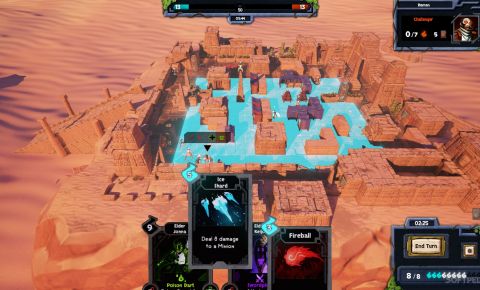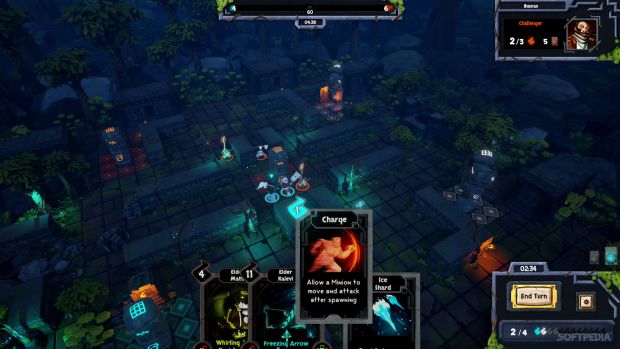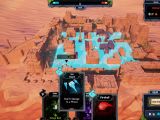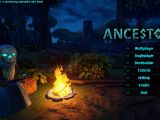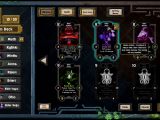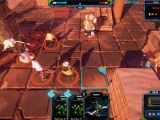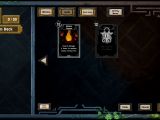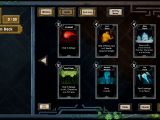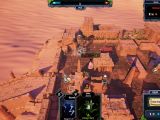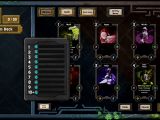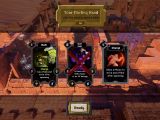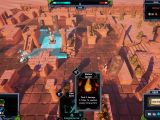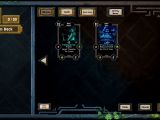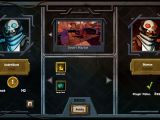Ancestory is the kind of video game that can crush your dreams in no more than three turns, mainly by making sure that the opposing shaman manages to perfectly use his located amount of mana to get off one offensive spell and summon two creatures to secure that totem that seemed forever out of his touch.
The game from Kajak Games can also create superb moments of triumph using the same core mechanics, with the perfect creature and the perfect spell coming in together in the hand of the player just as he needs them to secure those final points that take him over the victory threshold.
Ancestory manages to mix card and tactical elements in some interesting ways, but it has relatively limited variety that can hurt it in the long-term.
Story
Ancestory does not have too much to offer in terms of story because the entire experience is built around a set of mechanics that could as easily accommodate a science fiction or a medieval theme as it does the one chosen by the development team: ancient tribes that are forever at war.
The player takes control of a shaman who has mystical powers, and the entire design of the units and the spells suggests that the action is taking place somewhere in the middle of South America a few thousand years ago, although it could just as easily be Egypt or the lost continent of Atlantida.
Ancestory has no dialogue and limited written text other than the tutorial, which manages to be informative and does a good job of explaining the core ideas of the title.
This means that the title comes across as a little lacking when it comes to personality, and I would have liked to see the opposing shamans and creatures trade insults or taunts in order to spice up the action a little.
Gameplay
Ancestory is a combination of card- and turn-based tactics that concentrates on individual matches where gamers need to focus on both territorial control creature and spell combat in order to gain the upper hand.
The experience created by Kajak Games aims to be first and foremost accessible and will be easy to understand and play for those who have at least a passing acquaintance with the genres mentioned above.
The battles take place on a variety of maps, each of them with a particular layout, but all of them featuring totems that are crucial for victory.
When combat starts, each side has only a shaman on the board, who is able to use cards from the gamer's hand to bring forth creatures and to launch magical attacks, while also moving across the board.
Each of the minions involved in the fight has a number of hitpoints, and an attack value and generally the spells can be very powerful but also have some random elements.
Mana for all casting is offered every turn, with one extra point added as the count progresses, and the amount that's not spent during a gamer's turn wasted.
Gamers need to control the totems in order gain victory points, with the summoned creatures and spells only a means to an end, and a ten point bonus is given to the player who manages to kill the opposing shaman.
The structure of the title is very simple, but there's plenty of depth to the actual strategies that both the Artificial Intelligence and human players will use to get a win.
The start of every Ancestory match is a race for the closest totem in order to secure an initial trickle of points and both sides will struggle to put some weak minions on board in order to threaten enemy positions.
Once battle positions are set, a few turns later gamers will find that the cards they get from their deck will determine their upcoming moves and that the game requires gamers to think about both territory control and about how they can easily destroy enemy units.
Even minions that lose all their health can strike back before vanishing, which means that it's often a better idea to stay back and defend a position, trading tiles for time, rather than move forward to try and stop an enemy assault before it arrives.
There are some matches where the result is determined early on, and it is relatively boring to wait while one side reaches the victory point limit, but most games are interesting until the end, with impressive comebacks and surprising defeats.
Actual deck composition can be crucial and I have found that it is a good idea to have either one focused on relatively low-level creatures and powerful spells or one that has a mix of all the creatures offered by the development team but drops offensive spells for boosts and heals.
“Ancestory creates a solid feedback loop, moving from deck idea to initial implementation and then tweaking as the player uses a particular selection of cards to win or lose games.”
Ancestory has some solid ideas but it struggles to deliver variety when it comes to the cards that can be used in the deck and the maps on which battles take place, which in turn means that the actual combat can sometimes become repetitive and a little boring.
Graphics and audio
Ancestory does not aim to deliver a visual spectacle, but the title does a good job of drawing the attention of players to those elements of the action that will determine whether they win a match or not.
The art style for the cards, the creatures, and the spells is interesting, but it's a good idea for players to stay zoomed out in order to take in the entire battlefield rather than move closer to the action, where they will be disappointed by the quality of the models and textures.
Kajak Games does a good job of using colors on the interface to make sure that players know how they stand during a match and are always aware of the characteristics of each of their minions and how they can be best used to move towards victory.
The sound design is suited to the theme and the core ideas of Ancestory, although one character uses a phrase from Diablo that can quickly become grating.
Multiplayer
Ancestory allows gamers to go online with their decks in order to battle real world humans rather than the AI, with the same basic setup as for single-player matches.
The card and strategy elements of the game make it well suited for such matches, but the community of players who are interested is limited at the moment, and I only managed to launch just one multiplayer battle, which I lost because my deck was unbalanced.
The Good
- Card and tactics combination
- Matches can deliver surprising moments
The Bad
- Limited variety
- Lacks any kind of narrative
Conclusion
The development team has been talking about new free content and needs to deliver more cards that have different abilities and skills, enough to change up how a match flows when they are deployed.
The offered maps are solid variations on the same concept and can support a surprising amount of strategies, but it's relatively easy to learn them by heart, which takes some of the fun out of battles.
I liked the time I spent with Ancestory, mainly because it is simple to pick up and play and offers plenty of surprising moments, but the development team should try to deliver more content and make the multiplayer more engaging in order to turn the title into a long-term attraction.
Kajak Games is a small developer and has some cool ideas that can shake up some established genres but they need to focus more on pushing innovation and variety in their coming titles.
 14 DAY TRIAL //
14 DAY TRIAL // 